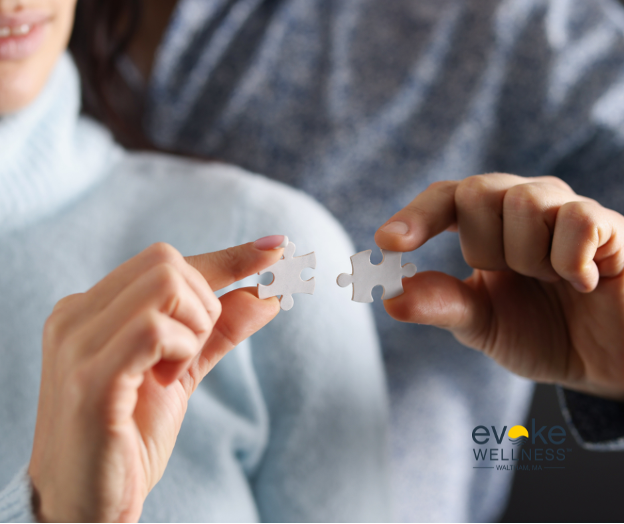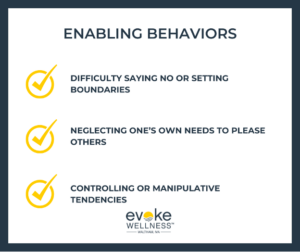You’ve likely heard the term codependence before – the unhealthy reliance on others for self-worth and identity. Codependence harms relationships. New research shows the power of moving beyond codependency into interdependence – maintaining a sense of self while connecting with others. This growth happens through treatment programs like:
- Mental health treatment
- Anxiety treatment
- Anger management
- Depression treatment
- 12 step recovery
- Group therapy
- Family therapy
- Trauma therapy
- Motivational interviewing
- EMDR therapy
These evidence-based programs help people become interdependent – balancing self-care with mutual support. Discover how to move from codependency to interdependence for healthier relationships.
Together, let’s embrace the journey to recovery and the promise of a new beginning. Call us at (833) 287-7223 today or reach out online.
From Codependency to Interdependence: Growth in Recovery Programs
Codependency, often rooted in trauma, breeds dysfunctional relationships and self-neglect. Recovery programs guide individuals from this unhealthy dependence on others toward interdependency – a balanced give-and-take allowing for mutual support and personal growth.
Studies show codependents make up over 80% of those seeking mental health treatment. Through therapies like:
- Family systems
- Motivational interviewing
- EMDR for trauma healing
Participants cultivate self-awareness, set boundaries, and develop interdependent relating skills for healthier bonds. As they shed codependent patterns, true interdependence emerges – the catalyst for lasting recovery.
What Is Codependency?
Codependency refers to an unhealthy reliance on others for one’s sense of self-worth and identity. In codependent relationships, one partner sacrifices their needs to cater to the other’s demands, often enabling destructive behaviors like substance abuse.
Roots of Codependency
Codependency frequently arises from close relationships with those struggling with addiction, mental illness or trauma. Support groups like Al-Anon help loved ones understand their codependent patterns and focus on self-care during another’s recovery process.
Seeking Independence
Treatment aims to develop a healthy self-identity separate from codependent relationships. Counseling, family therapy and 12-step programs guide individuals in setting boundaries, improving communication and boosting self-esteem. The goal is interdependence – giving and receiving care in a balanced, mutually supportive way.
Key Features of Codependent Couples
Codependent relationships exhibit distinct patterns and behaviors characterized by an excessive emotional and psychological over-reliance on one’s partner. According to Evoke Wellness at Waltham, key features include:
Neglecting Personal Needs
Partners often neglect their own needs due to an extreme focus on caring for and trying to control their significant other’s emotions and behaviors.
Poor Communication
Communication tends to be poor, with conflicts avoided rather than resolved openly. Asserting one’s needs is seen as selfish.
Sacrificing Self
Individuals make significant personal sacrifices to maintain the relationship, enabling unhealthy dynamics.
Dysfunctional Origins
Many codependent individuals come from dysfunctional families with issues like substance abuse or lack of intimacy, unconsciously recreating those dynamics.
What Is Interdependence?
Interdependence is the healthy balance between giving and receiving support. It promotes equality in relationships, with neither person being overly dependent or controlling. Key aspects include:
- Maintaining autonomy and independence
- Mutual understanding and respect
- Open communication and compromise
Interdependence fosters emotional intimacy while allowing each person room for personal growth. It contrasts with codependency’s dysfunctional dynamics of enmeshment, caretaking, and denial of needs.
Key Features of Interdependent Couples
Interdependent couples display a healthy balance of togetherness and autonomy. They maintain strong emotional bonds while respecting each other’s boundaries and individuality.
Mutual Understanding & Support
They have open communication, understanding each other’s needs and offering support. Partners feel secure in being themselves without losing their identities.
Shared Responsibilities
Responsibilities like chores, finances and parenting are equitably shared based on skills and availability rather than rigid gender roles. Both feel empowered in the relationship.
Individual Growth
While deeply connected, interdependent partners encourage each other’s personal growth through separate interests, friendships and alone time. Their bond is strengthened, not threatened, by this independence.
Transitioning From Codependency to Interdependence
Recognizing Codependent Patterns
Codependency involves sacrificing one’s needs to unhealthily prioritize others. It breeds dysfunctional relationship dynamics driven by control issues, lack of boundaries and poor self-esteem. Recognizing core codependent traits like people-pleasing, difficulty communicating needs and overwhelming anxiety about others’ perceptions is key.
Building Self-Awareness and Assertiveness
Transitioning towards interdependence requires fostering self-awareness through therapeutic techniques like journaling, mindfulness and cognitive restructuring. Assertiveness training equips individuals to voice needs respectfully while upholding others’ boundaries. This balanced give-and-take dynamic underpins interdependent relating.
Cultivating Interdependence
True interdependence stems from valuing mutual need-fulfillment within the context of maintained autonomy. Both parties take responsibility for their needs while supporting each other’s growth compassionately. Healthy communication, trust and reciprocity become foundational to these enriching partnerships.
Interdependence vs Codependency: How to Know the Difference
Understanding Interdependence
Interdependence involves mutual reliance between partners or family members. Each person maintains a sense of self while offering support. Healthy boundaries exist.
Recognizing Codependency
Codependence is an excessive emotional or psychological reliance on a partner. It often involves low self-esteem, control issues, and enmeshment. Boundaries become blurred.
Mental Health Treatment Programs for Codependency
Evoke Wellness offers several evidence-based programs to help treat codependency and promote healthy interdependence. Their Dual Diagnosis Treatment Program addresses co-occurring mental health issues like codependency alongside substance abuse. The Personality Disorder Treatment Program focuses on relationship patterns that underlie codependent behaviors.
Therapy Approaches
- Cognitive-Behavioral Therapy (CBT), Dialectical-Behavioral Therapy (DBT), and Trauma Therapy help rewire unhealthy thought patterns driving codependence.
- Family Integration and Group Therapy provide support understanding codependency’s impacts.
- Motivational Interviewing builds readiness for positive change.
Complementary Programs
- 12-step programs like Al-Anon help stop enabling behaviors and build a support network.
- Treating any co-occurring disorders, like depression or anxiety, through integrated treatment plans.
Group Therapy Program for Codependency Recovery
A Supportive Environment
In our codependency recovery group therapy program, you’ll find a compassionate space to explore unhealthy relationship patterns. Through open discussions and therapeutic activities, gain insights into codependent behaviors.
Develop New Skills
Learn practical tools to set boundaries, improve communication, and build self-esteem. Our experienced therapists guide you in cultivating interdependence – the ability to be self-sufficient while nurturing healthy connections.
A Sense of Community
Connect with others on a similar journey. This shared experience fosters understanding, validation, and accountability as you implement positive changes. The group’s encouragement empowers sustainable growth.
Family Therapy Program for Healthy Interdependence
Family therapy helps foster healthy interdependence – supporting individuality while maintaining close connections. Through open discussions, you’ll learn:
- Assertive communication skills
- Boundary-setting techniques
- How to balance self-care with caring for loved ones
The goal is developing mutually supportive, interdependent relationships free from dysfunctional codependency. Our licensed therapists guide the entire family toward greater understanding and healthier dynamics.
FAQ on Codependency vs. Interdependency
Codependency Definition
- Excessive reliance on others for approval and sense of identity/worth. Controlling behaviors and neglect of one’s own needs.
Interdependence Definition
- Mutually reliant and supportive relationship. Maintaining autonomy while nurturing healthy connections.
Key Differences
- Codependence is one-sided, interdependence mutual. Codependence has negative mental health impacts; interdependence fosters growth.
- Healthy families, support groups cultivate interdependence. Treatment dispels codependent patterns.
Conclusion
Looking inward can be difficult, but personal growth starts with understanding ourselves. By recognizing codependent patterns, we gain insight. With compassion and perseverance, we can move toward interdependence. Recovery is a journey of small steps. Each moment of clarity and choice plants seeds of change. Tend these seeds through self-care practices. Seek support and stay engaged in your process. Growth emerges gradually as we learn to honor our needs while respecting others. When we embrace interdependence, we are both giver and receiver, student and teacher. With open hands and open hearts, we walk together.
Begin Your Journey with Evoke Wellness at Waltham
If you or a loved one is considering outpatient treatment, Evoke Wellness at Waltham invites you to contact us. Our compassionate team is ready to answer your questions, discuss your needs, and help you take the first steps toward recovery. At Evoke Wellness, you will find more than just a treatment program – you’ll discover a community dedicated to your wellness and success. Together, let’s embrace the journey to recovery and the promise of a new beginning. Call us at (833) 287-7223 today or reach out online.



